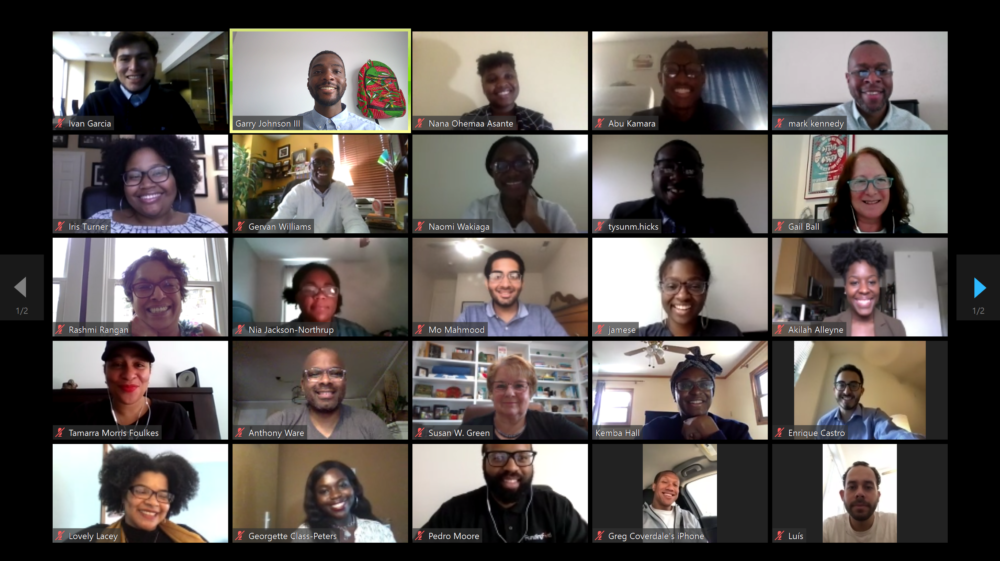After two cohorts of First Founders, startup accelerator-turned-501(c)(3) nonprofit, founder Garry Johnson III has taken what he’s learned and is going bigger and better, he says, with a new virtual program called the Inclusive Startup Accelerator (ISA).
Like First Founders, the Inclusive Startup Accelerator is geared toward founders who are, as Johnson puts it, “underestimated and underrepresented.”
At first glance, the six-week ISA looks like a smaller program than the twelve-week First Founders accelerator. Not so, says Johnson.
“What we’ve learned is that doing a 12-week accelerator isn’t enough,” he said. “It’s great to get everybody’s gears turning, to give them that access to some funding, to make those connections — all that is necessary. But typically what happens with these programs is after those 12 weeks are over, you’re kind of just out on your own.”
In contrast, ISA is about building a community that helps each other over the long term.
“What we’re doing with this cohort, instead of laying the groundwork and focusing on the basics of entrepreneurship and venture capital and fundraising, we’re taking it to the next level, focusing on building and gaining traction,” Johnson said. “Before it was primarily like, ‘OK, you’re not sure how to design your business model, you don’t know what design thinking is, you don’t know all the financing options that are available to startups.’ We used to focus a lot on that but not so much on the building of your startup.”
Johnson believes that by setting intentional goals and tracking key metrics weekly, it will create an open community of founders who support each other.
“When we all do that together and are open about what everyone’s goals are, the community holds itself accountable to reaching their goals,” he said.
The six-week cohort, running from Oct. 24 through Dec. 5, will end with a pitch competition in early January, complete with a $10,000 award sponsored by the Delaware Prosperity Partnership.
“We’re going to get everybody ramped up, accelerate their growth, then take a break in December and kick off the new year with the pitch competition, which we plan on giving our own creative twist,” Johnson said. “It’s not going to be your traditional pitch competition where you tune in live and watch pitches, it’s not going to be recorded pitches.”
The whole thing will be tied into the First Founders podcast, “Innovation Included,” which features mentor sessions and will include members of the new cohort interacting via Zoom.
“I’m the host, but our content comes from a lot of different areas,” Johnson said. “Typically, people are doing one-on-one interviews with people, but to build on our mission of being more inclusive and sharing knowledge. We’ll invite some mentor guests, but the best insights have come from founders sharing with one another, so the focus will be more community-powered.”
Applications for the first cohort of the Inclusive Startup Accelerator opened up last week and will close Friday, Oct. 16. Anyone and everyone is welcome to apply, Johnson said.
“You could be at the idea stage. We have a pretty diverse cohort as far as where people are at with their startup,” he said. “Some are in the idea stage, some are testing minimum viable product, others have been in business for a couple of years and are looking to continue to grow and learn and support others.”
Graduates of the First Founders 12-week accelerator, some of whom may participate in ISA, include Kemba Hall, founder and CEO of HairSense; Michael Shumate, founder of Keyhole Games; Mark Kennedy, founder of SusuBean; Connie Miles, founder of TaMiCaRa Designs; and Earl Cooper and Olajuwon Ajanaku, cofounders of Eastside Golf.
Before you go...
Please consider supporting Technical.ly to keep our independent journalism strong. Unlike most business-focused media outlets, we don’t have a paywall. Instead, we count on your personal and organizational support.
Join our growing Slack community
Join 5,000 tech professionals and entrepreneurs in our community Slack today!

The person charged in the UnitedHealthcare CEO shooting had a ton of tech connections

From rejection to innovation: How I built a tool to beat AI hiring algorithms at their own game

Where are the country’s most vibrant tech and startup communities?


